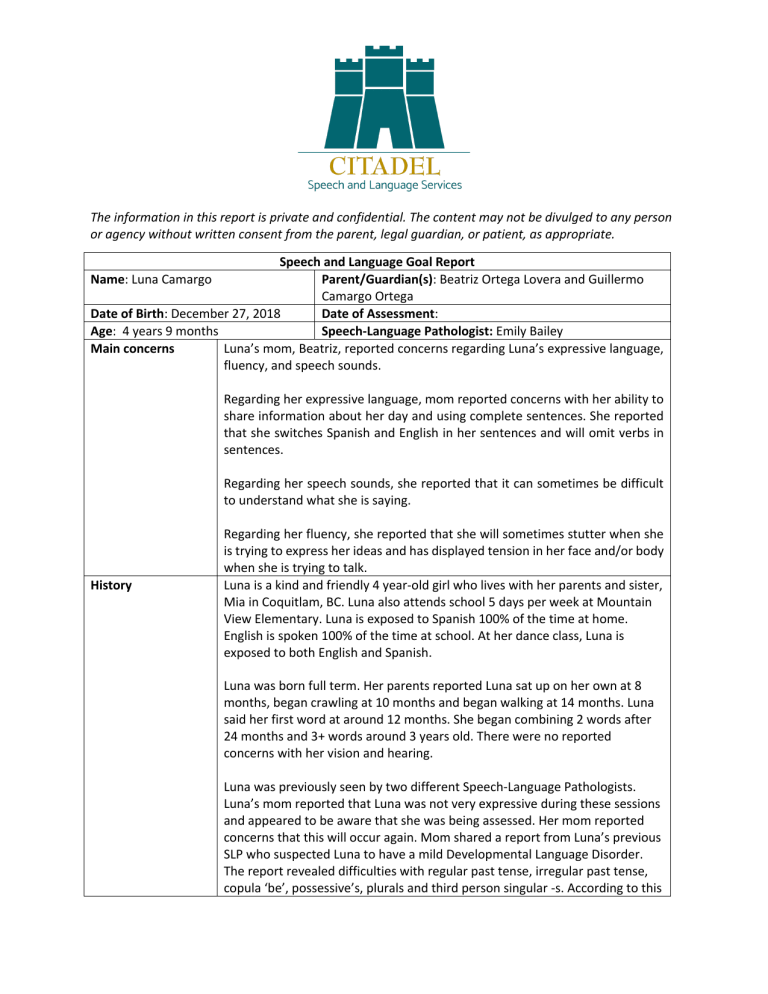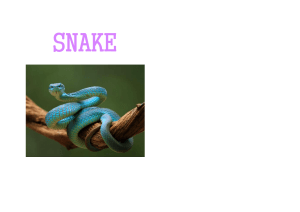
The information in this report is private and confidential. The content may not be divulged to any person or agency without written consent from the parent, legal guardian, or patient, as appropriate. Speech and Language Goal Report Parent/Guardian(s): Beatriz Ortega Lovera and Guillermo Camargo Ortega Date of Birth: December 27, 2018 Date of Assessment: Age: 4 years 9 months Speech-Language Pathologist: Emily Bailey Main concerns Luna’s mom, Beatriz, reported concerns regarding Luna’s expressive language, fluency, and speech sounds. Name: Luna Camargo Regarding her expressive language, mom reported concerns with her ability to share information about her day and using complete sentences. She reported that she switches Spanish and English in her sentences and will omit verbs in sentences. Regarding her speech sounds, she reported that it can sometimes be difficult to understand what she is saying. History Regarding her fluency, she reported that she will sometimes stutter when she is trying to express her ideas and has displayed tension in her face and/or body when she is trying to talk. Luna is a kind and friendly 4 year-old girl who lives with her parents and sister, Mia in Coquitlam, BC. Luna also attends school 5 days per week at Mountain View Elementary. Luna is exposed to Spanish 100% of the time at home. English is spoken 100% of the time at school. At her dance class, Luna is exposed to both English and Spanish. Luna was born full term. Her parents reported Luna sat up on her own at 8 months, began crawling at 10 months and began walking at 14 months. Luna said her first word at around 12 months. She began combining 2 words after 24 months and 3+ words around 3 years old. There were no reported concerns with her vision and hearing. Luna was previously seen by two different Speech-Language Pathologists. Luna’s mom reported that Luna was not very expressive during these sessions and appeared to be aware that she was being assessed. Her mom reported concerns that this will occur again. Mom shared a report from Luna’s previous SLP who suspected Luna to have a mild Developmental Language Disorder. The report revealed difficulties with regular past tense, irregular past tense, copula ‘be’, possessive’s, plurals and third person singular -s. According to this SLP report, Luna uses the following phonological processes: word final consonant deletion, stopping of ‘th’, consonant cluster reduction, deaffrication and vowel simplification. She was also reported to have a frontal lisp. Assessment results Luna’s mom reported that she likes Princess Peach and playing with her kitchen toy. An informal assessment and clinical observations were completed to assess Luna’s speech, language, play and social skills. The assessment was completed in English. Luna was friendly when the SLP greeted her and warmed up quickly to the SLP. Luna attended well to all activities and was eager to engage with the materials brought by the SLP. The findings from the assessment are summarised below: When reading this report, please remember that your Luna’s performance on assessments may be affected by a number of factors such as their health on the day, medications they have taken, time of day or their mood. Receptive Language: Receptive Language is defined as the “input” of language, the ability to understand and comprehend spoken language that you hear or read. Through observations and discussion with Luna’ parents, the following strengths and areas for improvement were identified: Strengths in Luna’s receptive language skills were noted in her ability to identify objects, action words, and features of objects in pictures. She was observed to understand some basic concepts such as above, below, more, up, and down. She demonstrated the ability to follow multi-step instructions, understood whquestions (who, what, when where and why) and understood time sequences (e.g., first and next). Luna was occasionally observed to respond to ‘why’ questions with ‘what’ responses and ‘what’ questions with ‘who’ responses. She also at times needed instructions to be repeated more than once. Expressive Language: Expressive language is defined as ability to express oneself. This can include the ability to request objects, make choices, ask questions, answer, and describe events. Speaking, gesturing (waving, pointing), writing (texting, emailing), facial expressions (crying, smiling), and vocalizations (crying, yelling) are all examples of expressive language. Through observations and discussion with Luna’s parents, the following strengths and areas for improvement were identified: Relative strengths in Luna’s expressive language were noted in her ability to make requests, ask questions, label items in pictures, label functions of objects, and use sentences with multiple words. While playing with various toys, she described her current actions as well as what she was planning to do next and gave instructions to the SLP. She was observed to use negation (e.g., “he don’t do nothing”), articles (e.g., “I can find the key”, “a treasure box”), prepositions (e.g., “he jump in and then he go to fight bowser”) and conjunctions (e.g., because, if, when, so). She was observed to mainly use present tense in conversation as well as simple future tense with ‘will’ when describing her next actions during activities (e.g., “I will add some cheese”). She asked whquestions as well as questions beginning with ‘do’ (e.g., “do you like Toad?”). Areas of improvement were noted in Luna’s expressive language. Luna was observed to omit copula ‘be’ from her sentences (e.g., “a shark gonna get us”) and made inconsistent errors with plurals (e.g., “do you have any sprinkle?”). Luna was observed to have difficulty using past tense verbs and typically used the verb in first person instead of the past tense form (e.g., “the pirate drop the treasure box that make the x”, “it start raining”). She was not observed to use third person singular -s in present tense and instead used the first person singular verb form. Errors were also noted with the verb ‘do’ (e.g., “Peach don’t fall down, “he had to did it, he had to do all the stuff”). While sharing what Luna was going to be for Halloween and asking what the SLP’s mom was going to dress up as, she used the noun ‘costume’ as a verb (e.g., “what her gonna cost?”, “my cost is Princess Peach”). She was observed to make errors with pronouns, substituting ‘she’ for ‘he’ or ‘her’ (e.g., “and then he trap her, cause her is crying”). Luna was noted to refer to any time in the future as ‘tomorrow’. For example, when the SLP asked when her birthday is she said “tomorrow” and followed this by saying it’s in “too many weeks”. She was observed to use ‘too many’ in replacement of more appropriate concept words for the context such as ‘many’, ‘a lot’, ‘so’ or ‘very’ (e.g., “my birthday is in too many weeks” “Bowser is so, so, so big, too many big”, “there’s too many mushrooms”). In conversation, it was sometimes difficult to follow the ideas she was trying to express. For example, when describing the Super Mario movie, she spoke quickly and used vague language, making it difficult for the SLP to fully understand what she was describing. Below are two examples of Luna discussing the Super Mario movie. “Now princess peach is so happy because they make her too many purple, so nobody see Princess Peach castle because Bowser wanna take her because he moving his boat to make it because that wanna move it like purple too cause nobody wanna see Princess Peach castle”. “I saw a sound inside ‘haha’ and then Princess Peach said ‘help me’ and then he trap her because her is crying cause he wanna save her because Bowser is so so so big, too many big”. For more information on language and social development, you may access resources online such as those by HealthLinkBC and Therapy Materials Vault (please note some materials may require purchase) or speak with your Speech-Language Pathologist for more information. Oral Narration: Oral Narration measures the ability to weave words and sentences into stories that contain characters who engage in goal-directed actions that are related to complicating event, consequences, and resolutions. The SLP created a short story using picture cards and asked Luna to repeat the story back using the visuals for support. Below is the story the SLP created followed by Luna’s retell. Original Story: Once upon a time, a princess wanted to have a party with all of her friends, especially her best friend Daisy. She was cooking in her kitchen all day long. She set up her party outside with cakes, cupcakes, and tea for her friends. Suddenly, a storm came, and it started raining on her party. The princess was so sad, but she had an idea. She remembered she had a magic wand that would summon a dragon. The dragon flew by and blew fire all through the sky. It stopped raining, the party was saved, and the princess was so happy. Daisy came and loved all the food that the princess made for her. Luna’s retell: So princess on the kitchen and then it start. So, the princess so happy and it start raining, and then the princess sad and he have a magic. And the dragon is he’s making starting to the rain and then her happy and then daisy is so finish. Luna was able to recall most of the main events that occurred, including identifying the setting and the problem in the story. While the information she provided was generally correct to what happened in the story, she had difficulty restating many of the details of the story. Her story contained grammatical errors and contained inappropriate sentence structure, making the story difficult to follow. When asked to provide her own narrative with wordless picture cards, Luna included some of the essential story elements. Luna’s narrative was disorganized and appeared to be describing the events on the picture cards. Her retell contained many grammatical errors and incorrect sentence structure. She did not use causal relationships (e.g., “but”) or include a clear ending. Luna included temporal relationships (e.g., “and” or “and then”). She included unusual descriptions of pictures she was using to support her story such as “the unicorn eat the raining” in reference to a picture of a unicorn that was crying. Luna’s narrative: There’s a map when we (?) and the key. Then the pirate drop the treasure box that make the x. Then the key come up. Then he the key so he can open the treasure box then there’s a lot of the stuff into the treasure box then there’s a unicorn now he’s happy to see the treasure box and the unicorn is so eating raining and then this the witch is so mad and then the ice cream it fall down and then the cloud is raining and then and then they finish the ice cream. Play and Social Skills: Social skills refer to Luna’s ability to interact with other people. Many different skills fall under the umbrella of social skills, including understanding social rules, using correct body language, using appropriate language, and using empathy to understand the world from someone else’s point of view. Many children with language delays also have difficulty with social interaction. The following observations were made of Luna’s social and play skills during the assessment: Luna demonstrated strong play and social skills. She was engaged with the SLP throughout the assessment and was open to trying new activities. Luna was also eager to share her toys with the SLP. She was flexible to new ideas and was observed to be very creative in her play. Luna engaged in pretend play with a dollhouse, kitchen toys, puppets, and her stuffed animal. Luna demonstrated perspective taking skills through her story telling as well as through pretend play where she created dialogue from the perspective of puppets and stuffed animals. She participated in back and forth conversation and asked SLP personal questions such as what the SLP was going to dress up as for Halloween and who the SLP’s favourite Mario character is. When playing games with a set of rules (e.g., Dragon Dash, Guess Who), Luna was observed to create her own rules for the game. SLP gave Luna reminders about how the game is intended to be played, but she preferred to play the game in her own way. Fluency Fluency was not formally assessed. Luna was observed to occasionally use partial phrase repetitions and revisions in conversation, particularly when speaking quickly. This will continue to be monitored. Articulation and Phonology Luna’s articulation was assessed through informal assessment and clinical observations to determine what sounds she can or cannot say at this time. Please Note: these age expectations are based upon research on monolingual English- speaking children and may not be fully representative of norms for bilingual, dual language learning children. Luna’s use of phonological processes was observed. Phonological processes are patterns of sound errors that typically developing children use to simplify speech as they learn to talk. Luna exhibited use of the following phonological processes(patterns) at word-level, sentence-level and in conversation. The following phonological processes were marked as present during the evaluation: 1. Final Consonant Deletion: Occurs when consonants at the end of the word are left off. Example: cheeseàchee, fridgeà fwi. Typical age of elimination: 3 years 2. Stopping: When a fricative (like ‘v’ or ‘s’) or affricate (ch,j) is substituted with a stop consonant like ‘p’or ‘d’ Example: treasure à treadure, thatà dat, brother à bruda. Typical age of elimination: /f/, /s/ by 3; /v/, /z/ by 3 1/2; sh, ch, j by 4 1/2; th gone by 5. 3. Fronting: Occurs when velar or palatal sounds, like ‘k’ or ‘g’, and ‘sh’, are substituted with alveolar sounds like ‘t’, ‘d’, and ‘s’. Example: parkà part. Typical age of elimination: 3.5 years. 4. Cluster Reduction (l-blends): Occurs when a consonant cluster is reduced to a single consonant. Examples: blueberry à boobewwy. 5. 6. 7. 8. Recommendations Typical age of elimination: Gone by 4 years without /s/, gone by 5 years with /s/. Weak Syllable Deletion: Occurs when the weak syllable of a word is left off. For example, ‘banana’ becomes ‘nana’. Example: Luigi à wigi. Typical age of elimination: 4 years. Deaffrication: Occurs when an affricate, like ‘ch’ or ‘j’ is replaced with a fricative or stop like ‘sh’ or ‘d’. Example: peachà peash. Typical age of elimination: 4 years. Gliding: Occurs when ‘r’ becomes a ‘w’, and ‘l’ becomes a ‘w’ or ‘y’ sound. Examples: let’s à wets, forgot à fowgot, princessà pwinceth. Typical age of elimination: 6 years. Vowelization: Occurs when the ‘l’ or ‘er’ sounds are replaced with a vowel. Examples: hereà heuh, gingerà ginguh. Not developmentally typical at any age. Luna was also observed to have a frontal lisp. Her tongue was observed to be between her front teeth when saying words with ‘s’ which resulted in this sound being produced as ‘th’. From my observations and interactions with Luna, she presents with delayed expressive language skills and a speech sound delay. She presents with ageappropriate receptive language skills as well as appropriate social and play skills. Although Luna’s receptive language skills appear to be stronger than her expressive language skills, there is a strong relationship between receptive and expressive language. Therefore, delays in one domain would indicate delays also being present in the other. It should be noted that much of the data used to interpret Luna’s results are based on data from monolingual English-speaking children and therefore may not be fully representative of the skills expected of Luna by this age. Therefore, these results should be interpreted with caution. Initial Goals It is recommended Luna receives services from a registered Speech-Language Pathologist. It Is also recommended that Luna undergo a full hearing assessment with a registered audiologist to rule out any possible hearing loss that could be impacting her language input. It is recommended that Luna has her speech and language skills re-evaluated in the future to track progress as well as determine if there are remaining skills that need to be targeted. 1. Given an activity, object, or picture to describe, Luna will improve her ability to form grammatically correct simple sentences using correct adverbs, verb forms and pronouns with 80% accuracy across two consecutive sessions. 2. Luna will use basic concept words including temporal (e.g., first, next last), spatial (e.g., on, in under, in front, behind, etc.) and quantitative (e.g., more, less, few, many, etc.) with 80% accuracy over two consecutive sessions. 3. Given a picture or object to describe, Luna will produce fricative consonants /s/, /z/, and /th/ at word, phrase, and sentence level with 80% accuracy over two consecutive sessions. It is a pleasure to work with Luna and her family. For questions, I can be contacted directly at 250-5162500 or emilyslp@citadel.ca. Kind Regards, Emily Bailey, RSLP Registered Speech-Language Pathologist #2990

